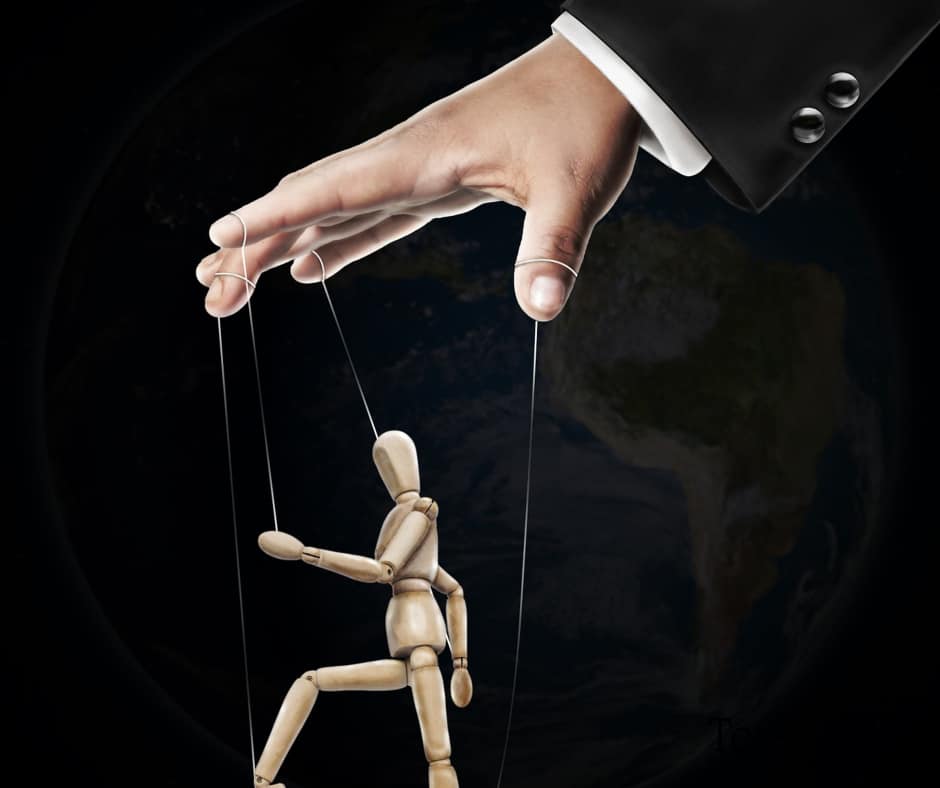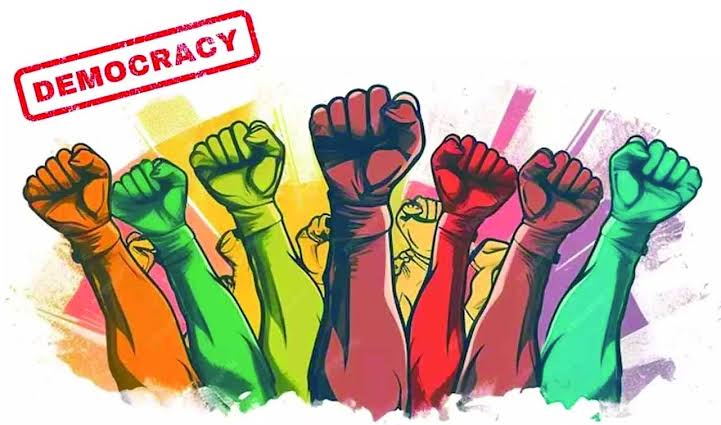The Architecture of Control: When Power Trumps Principle

In an increasingly interconnected world, there's a growing unease about powerful systems that appear to prioritize control and self-preservation over the well-being and rights of people.
An "architecture of control" is emerging or entrenching itself across political regimes, corporate structures, and technological frameworks.
This systemic shift, where the pursuit of power consistently overrides ethical principles, is shaping societies, eroding trust, and fundamentally altering the relationship between institutions and individuals globally.
Mechanisms of Systemic Control
The defining characteristics of systems that prioritize power over principle are often subtle and pervasive. These systems operate through mechanisms of manipulation, suppression, and centralization.
SOURCE: Google
Instead of overt force, they often employ information control, using propaganda and disinformation to shape public opinion and manufacture consent.
By controlling the narrative, these systems can justify their actions, discredit dissent, and maintain an image of legitimacy.
They also suppress dissent through both legal and extra-legal means, from censoring online speech and jailing journalists to using state-sponsored trolling to intimidate critics.
The core of this architecture is the centralization of authority in the hands of a few. Whether it's a political elite consolidating power or a corporation establishing a monopoly, the goal is to eliminate checks and balances.
This concentration of power allows for decisions to be made with little to no accountability, enabling the system to act in its own self-interest, often at the expense of human rights and public welfare.
The system's self-preservation becomes its highest value, trumping all other principles.
Technology as a New Tool for Control
Advancements in technology, particularly in AI, surveillance, and data collection, enable new and more sophisticated forms of control.
SOURCE: LinkedIn
Digital authoritarianism leverages technology to monitor citizens on a mass scale.
Sophisticated AI-powered surveillance cameras with facial recognition can track individuals movements, while digital platforms collect vast amounts of data on our communications, online behavior, and even our political affiliations.
This blurs the line between convenience and coercion. For example, a "social credit system" can use this data to rank citizens based on their behavior, tying their access to services like loans or travel to their compliance with state-sanctioned norms.
The use of this technology also creates a chilling effect on free speech and assembly. When individuals know they are being watched, they are more likely to self-censor and avoid engaging in dissent.
The algorithmic manipulation of information on social media platforms can also be used to spread propaganda, create echo chambers, and polarize populations, making it easier for controlling powers to divide and conquer.
This technological infrastructure for control is often justified under the guise of national security or public safety, but its true purpose is to reinforce power.
Political and Economic Instruments of Control
Political and economic structures are not separate from this architecture of control; they are its key instruments.
Political systems can become instruments of control through authoritarian crackdowns on civil society, the judiciary, and independent media.
Governments can pass laws that restrict freedom of expression and assembly, using a legalistic approach to legitimize their suppression of dissent.
Propaganda is disseminated through state-controlled media, reinforcing a single, approved viewpoint and eliminating alternative perspectives.
In the economic sphere, corporate monopolies and data exploitation serve a similar purpose.
SOURCE: LinkedIn
Tech giants that control vast platforms have a de facto monopoly on information and communication, allowing them to shape market behavior and suppress competition.
They exploit user data to gain an immense competitive advantage, which can lead to labor exploitation and the entrenchment of economic inequality.
This concentration of corporate power can also influence politics through lobbying and financial contributions, creating a feedback loop where political power reinforces economic control, and vice versa.
Consequences for Society and Individuals
The consequences of living under such systems are profound and far-reaching. For individuals, there is a marked erosion of personal freedoms and privacy.
SOURCE: Google
The constant surveillance and potential for social or professional repercussions for non-conformity lead to self-censorship and a decline in spontaneous social interaction.
It creates a culture of fear and mistrust. Democratic processes are undermined as the public's ability to hold power accountable diminishes.
With a controlled media and a silenced opposition, elections may become mere formalities, lacking genuine choice or meaningful debate.
Social cohesion and economic equity are also at risk. The "inequality machine" of wealth concentration is often a feature of these systems, where economic power is used to reinforce political power.
This leaves marginalized communities and those without access to capital trapped in a cycle of poverty and disenfranchisement.
The lack of transparency and accountability erodes public trust in institutions, leading to widespread cynicism and social fragmentation.
Justifying Control
Controlling systems rarely present themselves as malevolent. They justify their actions by invoking powerful, widely accepted narratives.
A primary narrative is that of security. Leaders argue that to protect citizens from threats like terrorism or crime, a certain degree of surveillance and a sacrifice of privacy are necessary.
This trade-off is often framed as a choice between a safe, orderly society and a chaotic, dangerous one. Another common narrative is that of stability and efficiency.
Authoritarian regimes often point to their ability to execute large-scale projects and maintain social order, arguing that such progress would be impossible in a messy democracy with its internal disagreements and slow-moving processes.
Technological platforms also use justification. They frame data collection as a way to provide personalized, convenient services, arguing that "you have zero privacy anyway, get over it."
These narratives, often repeated through controlled media and social platforms, are designed to make the public compliant or indifferent to the erosion of their rights, making the architecture of control appear not as an imposition, but as a necessary and even beneficial reality.
Points of Resistance and the Path Forward
Despite the overwhelming power of these systems, there are points of resistance and potential pathways to challenge them.
One of the most powerful forms of resistance is the advocacy for digital rights. Organizations and activists are working to expose the misuse of technology, push for stronger data protection laws, and hold tech companies accountable for their role in surveillance.
Movements for transparency and accountability are demanding that governments and corporations be more open about their use of data and algorithms.
International bodies and civil society groups are working to establish global norms and legal frameworks that protect human rights in the digital age.
This includes pushing for international treaties on surveillance and data ownership.
At a grassroots level, individuals and communities are finding creative ways to bypass censorship and surveillance, using encrypted communication tools and decentralized networks to reclaim their digital sovereignty.
The path forward involves not just reacting to the architecture of control but actively building an alternative: a world where technology and power are used to empower, not oppress, where transparency is the norm, and where the well-being and rights of people are always the top priority.
Recommended Articles
Salary Hike for Nigerian Politicians: Relief for Leaders, Hardship for the People?

The Nigerian government justifies salary increases for top officials as a response to economic realities, but ordinary N...
The Coup Contagion: Can ECOWAS Still Keep West Africa Together?

West Africa faces a surge of military coups, challenging ECOWAS’ role as the region’s stabilizer. Can the bloc reform, r...
Africa’s Unity; A Lie We Like to Tell Ourselves?

Despite decades of Pan-African rhetoric, visa restrictions, xenophobia, and protectionism continue to divide the contine...
Is Democracy Working for the Average African Youth?

Despite regular elections and democratic systems, many African youth feel excluded from real change. This article examin...
You may also like...
World’s Strongest Currencies Compared to the U.S. Dollar

The Dollar may be powerful, but it’s far from the strongest. See the top currencies in the world that outshine it, and w...
World’s Strongest Currencies Compared to the U.S. Dollar

The Dollar may be powerful, but it’s far from the strongest. See the top currencies in the world that outshine it, and w...
Why Do Africans Become More African After Leaving Africa?

Why do Africans abroad suddenly embrace their roots with pride? From Afrobeats in London to Yoruba weddings in New York,...
Boxing Icon's Son in Legal Turmoil: Julio Cesar Chavez Jr. Faces Cartel Allegations & Deportation Drama!

Mexican boxer Julio César Chávez Jr. has been deported from the U.S. to Mexico, where he was immediately jailed for alle...
Super Falcons Make History: Nigeria Crowned WAFCON Champions for 10th Time in Thrilling Win!
)
Nigeria's Super Falcons made history by clinching their 10th Women's Africa Cup of Nations title with a spectacular 3-2 ...
Paolo Sorrentino's 'La Grazia' Dazzles Venice, Earns Raves

Paolo Sorrentino's latest film, 'La Grazia,' captivated the Venice Film Festival, earning a four-minute standing ovation...
KPop Demon Hunters Ignites Oscar Buzz, Captivates Audiences

The animated film "KPop Demon Hunters" has emerged as a record-breaking global phenomenon, topping Netflix viewership ch...
Naira Marley Breaks Silence: Explosive Defense in Mohbad Case Rocks Nigeria!

Naira Marley has released a documentary sharing his side of the story regarding the tragic death of his former signee, M...